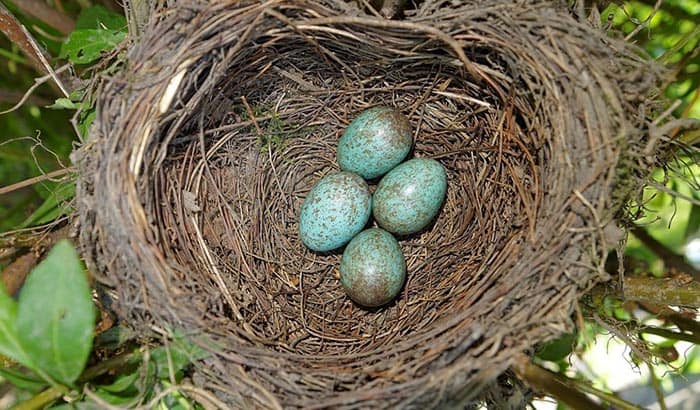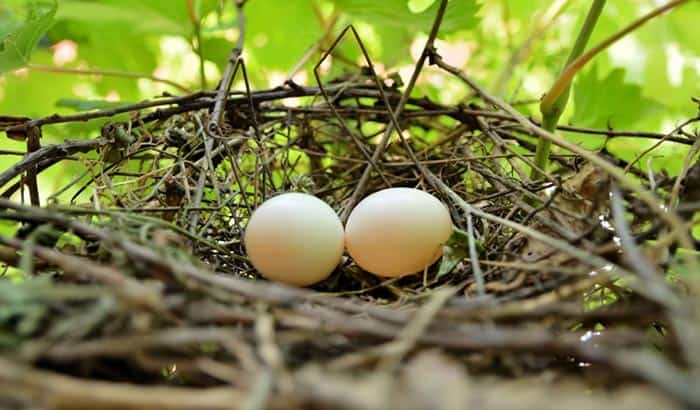Sometimes, bird nests are abandoned, with eggs still inside. Why do birds abandon their nests when they invest so much energy to build their homes? For your information, many believe that there are three main reasons why birds leave their eggs:
- The first reason is that the bird had more than one egg in her nest and could not care for both at once
- Or, it could be that the eggs were not fertilized or healthy enough to hatch after being laid, which led to the mother bird abandoning the nest
- Finally, it could be because predators have chased away the mother bird from her nest, so she abandoned it rather than risking death by staying at the same place
Let’s find out the details.
Contents
Why do Birds Abandon Their Nests with Eggs?
1. Their Eggs are no Longer Viable
There are many reasons why birds might abandon their nests, but one of the most common is when they sense that the eggs cannot hatch.
This could be due to several factors, such as incorrect incubation or changes in temperature and humidity.
2. They Cannot Feed or Protect the Offsprings
At this point, it’s important to note how there are two types of birds: birds that lay their eggs and then go in search of food to provide for the young when they hatch. These are called “obligate nest abandoners,” birds who do not help raise the chicks once they have hatched.
The other type is birds who stay with their eggs even after hatching until the young fledge.
If the parents feel that they can’t provide for their young, they may also choose to abandon the eggs to try and save themselves. Birds have a built-in instinct to abandon the nest if they can’t protect their eggs any more because of injury or other factors.
3. It is the Mating Season
The first reason birds abandon their nests is due to the mating season. When birds are trying to mate, they are focused on finding a partner and building a nest, taking up a lot of time and energy.
If they have already laid eggs, there isn’t as much incentive for them to stay at the nest since they would be unable to incubate and raise the young themselves.
3. The Weather Conditions are Unbearable
The second reason birds abandon their nests is weather conditions, specifically rain. Constant exposure to wet conditions can increase the chance of disease in eggs and young chicks, leading to a higher mortality rate. This has been documented in studies on House Sparrows and European Starlings.
4. There are Signs of Human Disturbance
The third main reason birds abandon their nests is habituation or becoming used to humans being around. For example, if people are constantly walking by a nest and making loud noises, birds will eventually leave the area as they no longer feel safe incubating or raising their young there.
Birds lay their eggs and then search for food to provide for the young when they hatch. The abandoned nest signifies that birds have moved on from some disturbance, such as humans moving into the space where the birds may be nesting.
Studies have shown that this is especially prevalent with American Robins nesting near parks and other heavily populated areas.
It’s important to remember that there are many reasons why birds might abandon their nests, so it’s best not to disturb them if you see a nest with eggs. If the birds have already left, try to keep an eye on the eggs and call a wildlife rehabilitator or local conservation group if they appear to be in danger.
5. They are Attacked by Predators
Birds sense that the nest has been visited by other animals when they’re not around to incubate the eggs, which can cause them to leave their nest as well.
If predators harass or disturb them, they would find another suitable location than stay where they aren’t safe from predators such as cats that prey upon baby birds.
Other important information
How Long can Bird Eggs be Left Unattended?
This varies depending on the bird species, but typically birds will abandon their nests within two or three days if they’re not being incubated. However, birds’ eggs should not be left unattended for more than 24 hours. If birds’ eggs are left alone for over a day, it can lead to egg failure and the potential death of the birds.
It is essential to keep this in mind when caring for birds’ eggs and make sure they are always attended to.
How to Tell if a bird’s Nest with Eggs is Abandoned?
First, check the eggs. If they’ve been cracked or pecked at, likely, birds are still in the area. If they’re intact, it’s best to leave them alone for at least a few days to ensure that birds aren’t returning before removing them.
The birds may not return to the nest if they’ve been disturbed, so it’s important to take precautions when approaching a bird’s nest with eggs. The best time is in the early morning or late evening, and wearing neutral colors like brown and gray can help avoid attracting birds’ attention.
It’s also helpful to keep noise levels down – whispering, singing softly, or even whistling instead of speaking loudly will reduce the chance birds notice you’re there.
If possible, get someone else to watch from a distance, so birds don’t become spooked by one person nearby waiting for them to come back before removing their eggs. If no other people are around, wait at least an hour after sunset before checking on any nests with eggs/birds present.
If birds do not return within this period, there is no guarantee of successful hatching (depending on how long birds have been gone). Taking the eggs into a rehabilitation center for care might be necessary.
By helping to protect these nests, we can ensure that more baby birds will make it to adulthood!
Conclusion
There are many reasons why birds abandon their nests with eggs. The biological function of the birds leaving their nests with eggs is to offer an opportunity for other animals to take care of them.
Therefore, if you find a bird’s nest containing eggs, it may be best to leave it unharmed so another animal can take responsibility for the next stage in its life cycle.


